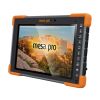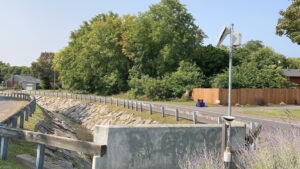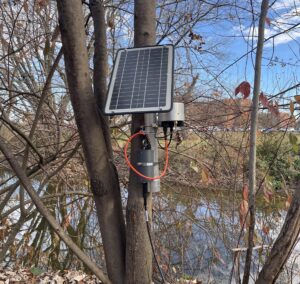Juniper Mesa 4 Rugged Tablet Computers
Features
- Waterproof, dustproof, shockproof
- Intel Gen12 UHD graphics and Windows 11 Pro OS
- Upgraded 4G cellular module (2x faster than Mesa 3)
- Free ground shipping
- Expedited repair and warranty service
- Lifetime technical support
- More
The Mesa 4 Rugged Tablet running Windows 11 offers powerful new functionality while retaining impressive features from the popular Mesa 3 Rugged Tablet. Its latest generation Intel processor is ready to run even the most demanding field data collection application, and its rugged ergonomic design is ready to handle a long day on the job in some of the harshest environments out there.
Built Juniper Rugged
Meeting IP68 and MIL-STD-810H ratings, the Mesa 4 is waterproof, dustproof, and shockproof. Rest assured rain, extreme temperatures, and dirt won’t stop a productive workday.
Powerful Processing Power
Expect lightning-fast speeds all day long with the Mesa 4’s latest generation N200 processor and 8 or 16 GBs of system memory (RAM). Running a full Windows 11 OS, this device is made to handle large files and detailed maps.
All-Day Usability
From its ergonomic enclosure to its sunlight-readable display to its all-day battery life, the Mesa 4 is made for long days on the job.
Carefully Designed and Supported
It’s more than a rugged tablet. Designed and assembled in the United States, the Mesa 4 promises device longevity and data protection. If it becomes necessary, each device is proudly supported by live and personalized customer support.
- Mesa 4 rugged tablet computer
- Standard removable battery
- AC wall charger with international plug kit
- Capacitive small-tip stylus w/tether
- Quick Start Guide
- Hand strap
- Connector port dust cover
In The News
Monitoring Meadowbrook Creek: Real-Time Data Collection in an Urban Creek
Meadowbrook Creek in Syracuse, New York, has been monitored by Syracuse University (SU) faculty and students for over a decade. Originally established by Dr. Laura Lautz in 2012, the early years of the program focused on collecting grab water samples for laboratory analysis and evaluating the impact of urban land use, human activities, and natural processes on water resources. Tao Wen , an Assistant Professor in SU’s Department of Earth and Environmental Sciences, took over the program in 2020 and upgraded the existing systems to include 4G modems that allowed for real-time data viewing. [caption id="attachment_39339" align="alignnone" width="940"] An overview of the Fellows Ave monitoring station along Meadowbrook Creek.
Read MoreLancaster County Makes the Switch to Real-Time Water Quality Monitoring Systems
Continuous data collection in Lancaster County, Pennsylvania, started about 5 years ago, and the county will be making a major upgrade over the next year—switching from relying solely on the internal storage of water quality sondes to telemetry units that enable real-time data viewing. [caption id="attachment_39295" align="alignnone" width="940"] The first telemetry unit was installed at LCCD along Little Conestoga Creek. (Credit: Tyler Keefer / LCCD) [/caption] Telling Lancaster County's Story Through Data Since the Lancaster County Conservation District started monitoring county waterways, the goal has remained the same, according to Amanda Goldsmith, Watershed Specialist for the Watershed Department.
Read MoreFrom Florida to the World: How a Smithsonian Research Station is Bridging Gaps in Marine Biology
In the early 2000s, along the coast of northern California, where the redwoods dominate the forests, and the Pacific Ocean shapes shorelines, a Humboldt University undergraduate student took the first steps into a lifelong love of marine biology. Dean Janiak accepted an invitation to help a graduate student with fieldwork in rocky coastal tide pools, and so began a journey that led him from California to Connecticut to Florida and eventually to the world, where he has facilitated research in communities across the globe. While finishing up his masters of Oceanography from the University of Connecticut, Janiak continued researching fouling communities–marine life that live on hard, often artificial surfaces such as docks–at the Smithsonian Environmental Research Center.
Read More














































